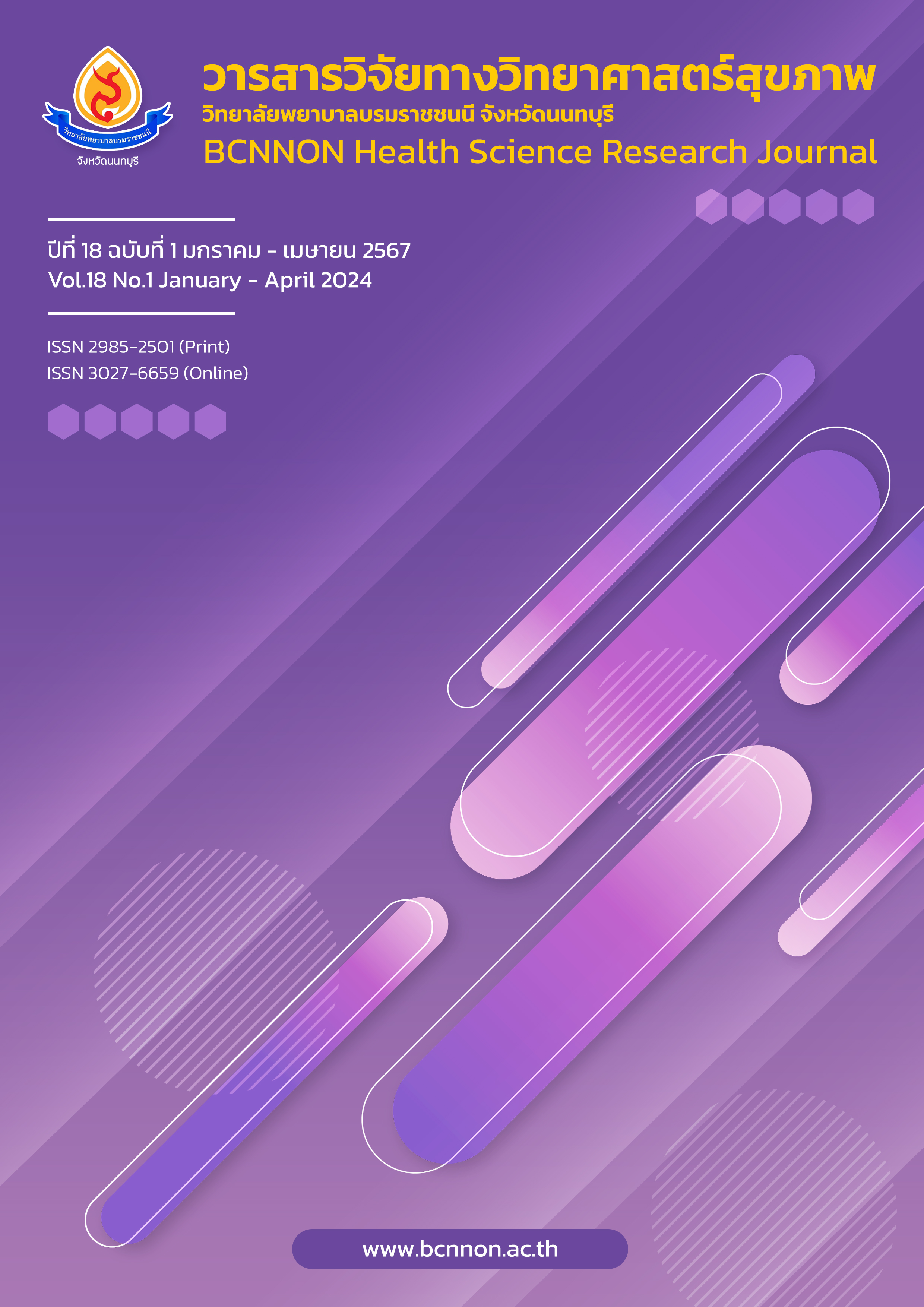Factors affecting sleep quality among drilling crew employees in offshore oil and gas industry
Main Article Content
Abstract
Background: The sleep quality of offshore crews, constantly exposed to occupational hazards, is of paramount.
Objectives: To analyze factors that affect the sleep quality of offshore oil and gas drilling crews.
Methods: The study included 228 samples from offshore oil and gas drilling operations in Thailand. Research tools comprised demographic data, a working environment questionnaire, the Thai-JCQ psychosocial work factors scale, and the Thai-PSQI sleep quality scale. Percentage and mean were employed for descriptive data analysis. Binomial logistic regression was used to analyze factors influencing sleep quality.
Results: Three factors affecting the sleep quality of drilling crews in the oil and gas industry were the working environment, which included a variety of work factors, and two working psychosocial factors, consisting of job security factors and psychological job demands.
Conclusions: The quality of sleep of drilling crew employees in offshore oil and gas drilling can be improved by implementing diverse work systems. Establishing work systems that instill a sense of job security is advisable, thereby reducing employees need for mental health-related psychological demands.
Downloads
Article Details

This work is licensed under a Creative Commons Attribution-NonCommercial-NoDerivatives 4.0 International License.
บทความที่ได้รับการตีพิมพ์เป็นลิขสิทธิ์ของวิทยาลัยพยาบาลบรมราชชนนี จังหวัดนนทบุรี
ข้อความที่ปรากฏในบทความแต่ละเรื่องในวารสารวิชาการเล่มนี้เป็นความคิดเห็นส่วนตัวของผู้เขียนแต่ละท่านไม่เกี่ยวข้องกับวิทยาลัยพยาบาลบรมราชชนนี จังหวัดนนทบุรี และคณาจารย์ท่านอื่น ในวิทยาลัยฯ แต่อย่างใด ความรับผิดชอบองค์ประกอบทั้งหมดของบทความแต่ละเรื่องเป็นของผู้เขียนแต่ละท่าน หากมีความผิดพลาดใด ๆ ผู้เขียนแต่ละท่านจะรับผิดชอบบทความของตนเองแต่ผู้เดียว
References
Asare BY-A, Kwasnicka D, Powell D, Robinson S. Health and well-being of rotation workers in the mining, offshore oil and gas, and construction industry: a systematic review. BMJ Glob Health. 2021;6(7):e005112. doi: 10.1136/bmjgh-2021-005112.
Hagan-Haynes K, Pratt S, Lerman S, Wong I, Baker A, Flower D, et al. US research needs related to fatigue, sleep, and working hours among oil and gas extraction workers. Am J Ind Med. 2022;65(11):840-56. doi: 10.1002/ajim.23310.
Parkes KR. Work environment, overtime and sleep among offshore personnel. Accid Anal Prev. 2017;99(Pt B):383-8. doi: 10.1016/j.aap.2015.11.022.
Suni E, Singh A. The relationship between sleep and workplace accidents. [internet]. 2023 [cited 2023 Dec 23]; Available from: https://www.sleepfoundation.org/excessive-sleepiness/workplace-accidents.
Riethmeister V, Bültmann U, de Boer MR, Gordijn M, Brouwer S. Examining courses of sleep quality and sleepiness in full 2 weeks on/2 weeks off offshore day shift rotations. Chronobiol Int. 2018;35(6):759-72. doi: 10.1080/07420528.2018.1466794.
Johnson DA, Billings ME, Hale L. Environmental determinants of insufficient sleep and sleep disorders: implications for population health. Curr Epidemiol Rep. 2018;5(2):61-9. doi: 10.1007/s40471-018-0139-y.
International Association of Oil & Gas Producers. IOGP safety database – largest database of E&P safety performance - releases 2021 data. [internet]. 2022 [cited 2023 Dec 23]; Available from: https://www.iogp.org/blog/news/ iogp-safety-database-largest-database-of-ep-safety-performance-releases-2021-data/
PTT Exploration and Production Public Company Limited. Annual report 2022. [internet]. 2023 [cited 2023 Dec 22] Available from: https://www.pttep.com/en/ Investorrelations/Publications/2022-Annual-Report.aspx.
Kline C. Sleep quality. In: Gellman MD, Turner JR, editors. Encyclopedia of Behavioral Medicine. New York, NY: Springer; 2013.
Buysse DJ, Reynolds CF III, Monk TH, Berman SR, Kupfer DJ. The Pittsburgh sleep quality index: a new instrument for psychiatric practice and research. Psychiatry Res. 1989;28(2):193-213. doi: 10.1016/0165-1781(89)90047-4.
Costa DD. Sleep and systemic lupus erythematosus. In: Sleep and quality of life in clinical medicine. Totowa, NJ: Humana Press; 2008.
Van Laethem M, Beckers DGJ, Kompier MAJ, Dijksterhuis Ap, Geurts SAE. Psychosocial work characteristics and sleep quality: a systematic review of longitudinal and intervention research. Scand J Work Environ Health. 2013;39(6): 535-49. doi: 10.5271/sjweh.3376.
Van Reeth O, Weibel L, Spiegel K, Leproult R, Dugovic C, Maccari S. Physiology of sleep (review)–interactions between stress and sleep: from basic research to clinical situations. Sleep Med Rev. 2000;4(2):201-19. doi: 10.1053/smrv.1999.0097.
Chirawatkul A. Statistics for health science research. Bangkok: Witthayaphat; 2010. (in Thai).
Ruankaew P. Case study: occupational stress and sleep quality related factors among machinery service offshore workers [thesis]. Nakhon Pathom: Mahidol University; 2015. (in Thai).
Polit DF, Beck CT. Nursing research: principles and methods. Philadelphia: Wolters Kluwer Health/Lippincott Williams & Wilkins; 2003.
Karasek R, Brisson C, Kawakami N, Houtman I, Bongers P, Amick B. The Job Content Questionnaire (JCQ): an instrument for internationally comparative assessments of psychosocial job characteristics. J Occup Health Psychol. 1998;3(4):322-55. doi: 10.1037//1076-8998.3.4.322.
Phakthongsuk P, Apakupakul N. Psychometric properties of the Thai version of the 22-item and 45-item Karasek job content questionnaire. Int J Occup Med Environ Health. 2008;21(4):331-44. doi: 10.2478/ v10001-008-0036-6.
Sitasuwan T, Bussaratid S, Ruttanaumpawan P, Chotinaiwattarakul W. Reliability and validity of the Thai version of the Pittsburgh Sleep Quality Index. Journal of the Medical Association of Thailand. 2014; 97Suppl3:S57-67.
Jimenez-Vaquero C, Alonso-Dominguez R, Garcia-Yu IA, Martín-Nogueras AM, Sanchez-Aguadero N, Crespo-Sedano A, et al. Analysis of the determinants of sleep quality in a Spanish population: a study protocol for a cross-sectional study. BMJ Open. 2023;13(3):e069444. doi: 10.1136/bmjopen-2022-069444.
Akerstedt T, Axelsson J, Lekander M, Orsini N, Kecklund G. Do sleep, stress, and illness explain daily variations in fatigue? A prospective study. J Psychosom Res. 2014;76(4):280-5. doi: 10.1016/j.jpsychores. 2014.01.005.
Kim Y-K, Kramer A, Pak S. Job insecurity and subjective sleep quality: The role of spillover and gender. Stress Health. 2021; 37(1):72-92. doi: 10.1002/smi.2974.
Chen X, Wei S. Enterprise social media use and overload: A curvilinear relationship. Journal of Information Technology. 2019; 34(1):22-38.


